READER COMMENTS ON
"THE HILL: House Administration Committee Chair, Millender-McDonald, Diagnosed With Cancer"
(19 Responses so far...)
COMMENT #1 [Permalink]
...
Dredd
said on 4/18/2007 @ 1:52 pm PT...
This might be a good time and place to continue the debate Zapkitty and I are conducting on another Bradblog thread.
The Senate version of HR 811 has not gone to committee yet and so EVM activists may be able to get into that bill and recapture the time potentially lost.
COMMENT #2 [Permalink]
...
Dredd
said on 4/19/2007 @ 6:51 am PT...
I have been reading the Senate compliment (S. 559) to HR 811 and my current reading makes it clear that paper ballots are supreme over electronic tallies:
(i) The voting system shall require the use of or produce an individual voter-verified paper ballot of the voter's vote that shall be created by or made available for inspection and verification by the voter before the voter's vote is cast and counted.
...
(iii) In the event of any inconsistencies or irregularities between any electronic vote tallies and the vote tallies determined by counting by hand the individual permanent paper ballots produced pursuant to subparagraph (A), and subject to subparagraph (D), the individual permanent paper ballots shall be the true and correct record of the votes cast and shall be used as the official ballots for purposes of any recount or audit conducted with respect to any election for Federal office in which the voting system is used.
(Sec. 2(a)(1), emphasis added).
Does anyone see anything wrong with that language?
COMMENT #3 [Permalink]
...
the_zapkitty
said on 4/19/2007 @ 9:45 am PT...
"Senate compliment (S. 559) to HR 811 and my current reading makes it clear that paper ballots are supreme over electronic tallies"
The bills each say the exact same thing in regards to that subject. Dredd. Aside from the two exceptions I mentioned elswhere the bills are identi cal. Thus I simply call the legislation "Holt II".
And nothing will change the simple fact that if the DRE electronic pseudo-ballot is used then the election officials are not required to count any paper ballots... not even the DRE "printouts"... and then the DRE pseudo-ballot disappears leaving nothing behind but a post-facto DRE "printout" that may, or may not, have anything to do with any electronic pseudo-ballot that may, or may not, have been counted.
The DRE-pseudo ballot installs the wrong person by a margin of 2.1% and no paper of any kind is ever counted.
And the audit provisions in "Holt II" only kick in if it was supposed to be a close race. The audit provisions fail (or simply refuse) to take in account a gamed election.
And even these lame audit provisions have been shown to be insufficient to detect outright fraud, much less the subtle shifting of a few votes per precinct that is all that's required to throw a close election... and the states can ignore the audit provisions anyway and make up their own even easier, even less likely to detect fraud versions... and all of that hinges on the DRE "printouts" not having been gamed in the first place.
And once the wrong person is installed via DRE pseudo-ballots it is damn near impossible to get them out again.
"Holt II" does not offer a true paper ballots solution... and that doesn't even begin to cover the other serious flaws in the legislation.
COMMENT #4 [Permalink]
...
the_zapkitty
said on 4/19/2007 @ 10:06 am PT...
Oops... getting punchdrunk.
The minumum audit under "Holt II" is 3 percent, which means that some paper is counted with every election unless the paper has been gamed... which would lead to the DRE pseudo-ballot ruling the day.
(... which is why I went on to explain that the audit provisions needn't find a damn thing wrong even with a screwed-up election...)
COMMENT #5 [Permalink]
...
Dredd
said on 4/20/2007 @ 6:01 am PT...
Zapkitty "I simply call the legislation "Holt II" ... I am sure the 200 co-sponsors of HR 811 will bow down to your demands  like all legislators have these 40 years of electronic voting. And the Senate is sure to call S 559 Holt's bill as well
like all legislators have these 40 years of electronic voting. And the Senate is sure to call S 559 Holt's bill as well  ... that's the ticket ... force them to do it our way. That has worked for ages now
... that's the ticket ... force them to do it our way. That has worked for ages now  ...
...
Are you saying that the term "individual permanent paper ballots shall be the true and correct record of the votes cast and shall be used as the official ballots for purposes of any recount or audit" does not appear in the text of the two bills?
If you agree that such text is in the bills, then what does "individual permanent paper ballots" mean to you in the context of these bills?
Note the words one at a time ...
individual
permanent
paper
ballots
Then as a group "individual permanent paper ballots" ...
COMMENT #6 [Permalink]
...
the_zapkitty
said on 4/20/2007 @ 9:10 am PT...
Dredd, could you please stop having orgasms over the words "paper ballots" long enough to indicate to us where in the the nearly-identical bills is the text that requires that the DRE printouts actually be counted in order to decide an an election?
Please also indicate to us where in the text the transitory and unverified electronic output of a DRE, the pseudo-ballot, is not allowed to decide an election.
COMMENT #7 [Permalink]
...
Dredd
said on 4/21/2007 @ 6:53 am PT...
Senator Nelson's bill would assist in finding bugs in EVM software:
`(9) PROHIBITION OF USE OF UNDISCLOSED SOFTWARE IN VOTING SYSTEMS- No voting system used in an election for Federal office shall at any time contain or use any software not certified by the State for use in the election or any software undisclosed to the State in the certification process. The appropriate election official shall disclose, in electronic form, the source code, object code, and executable representation of the voting system software and firmware to the Commission, including ballot programming files, and the Commission shall make that source code, object code, executable representation, and ballot programming files available for inspection promptly upon request to any person.
`(10) PROHIBITION OF USE OF WIRELESS COMMUNICATIONS DEVICES IN VOTING SYSTEMS- No voting system shall contain, use, or be accessible by any wireless, power-line, remote, wide area, or concealed communication device at all.
`(11) PROHIBITING CONNECTION OF SYSTEM OR TRANSMISSION OF SYSTEM INFORMATION OVER THE INTERNET- No component of any voting device upon which votes are cast shall be connected to the Internet at any time.
(S. 559, Section 247, emphasis added). To the extent that networks are prohibited tends to help against hacking too. And looking thru the source code would expose any communication logic that was intended to be surreptitious.
The only entities I can think of that would not like this section of the Senate Bill would be the Diebolds of the election world.
COMMENT #8 [Permalink]
...
Dredd
said on 4/21/2007 @ 6:59 am PT...
For those of us who care to think and read for ourselves, note that no electronic election machine software, including the mysterious and undefined "direct recording electronic" (a term that defies a singular definition IMO) has been made available "promptly upon request to any person" in this universe until the current bill.
If Senator Nelson's Bill (post #7) passess we will be able to study the code closely here, at BBV, and at Velvet Revolution (and anywhere else).
Software developers, and anyone else who can read code, will be able to quickly determine if any votes are not represented by paper ballot and merely recorded on disk somewhere.
We will see and know all.
It will be the end of the electronic voting machine as we have known it, and the criminal companies that have fostered them upon us (the ones who oppose this section).
COMMENT #9 [Permalink]
...
the_zapkitty
said on 4/21/2007 @ 9:24 pm PT...
... Dredd said...
"Senator Nelson's bill"
... which, mysteriously enough, says the exact same thing as Holt's bill in this regard... May the Puma Sisters preserve us, it's Holt II part 2! Run! 
"...would assist in finding bugs in EVM software:"
Oops! Dredd you mispelled "Asks for the impossible, so instead the bill will be subverted and rewritten to business as usual, i.e. "public inspection of source code not allowed", and thus the bill is misleading."
"To the extent that networks are prohibited tends to help against hacking too."
"... of any voting device upon which votes are cast..." means that tabulators and the servers using the ballot definition software are allowed to be hooked up to the internet... and the RNC did exactly that during a certain Presidential election in Ohio some years back... what was it now... wasn't it some 600,000 dead Iraqi citizens ago?
"And looking thru the source code would expose any communication logic that was intended to be surreptitious."
No. Such can be very subtle and can elude even computer specialists for months... open source is not a panacea for the fatal flaws of e-voting.
"The only entities I can think of that would not like this section of the Senate Bill would be the Diebolds of the election world."
Or those of us who realized it was a false promise from the beginning that cannot be kept... and wonder what the bill they do pass will actually say, and how badly will it cripple citizen oversight of elections.
"For those of us who care to think and read for ourselves, note that no electronic election machine software ... has been made available "promptly upon request to any person" in this universe until the current bill."
That's because it is literally impossible to do that wih current EVM's... because the EVM vendor does not own all of the source code in the machine.
This is explained carefully here:
https://bradblog.com/?p=4396#comment-221209
And is discussed in detail here:
http://www.bbvforums.org...essages/46591/46677.html
Full disclosure is impossible with current EVM's... but to achieve the stated goal nothing less than full public disclosure will do. And the authors of Holt II know that... so what do they plan to put in its place? Nothing good for citizen oversight, that's for sure.
The code will stay hidden from the public with Holt II... or Holt II will not be allowed to pass by the corporations.
"If Senator Nelson's Bill (post #7) passess we will be able to study the code closely here, at BBV, and at Velvet Revolution (and anywhere else)."
And as I said, Holt II will not, can not be allowed to pass with that provision, and the authors have been informed of why... so what do they plan to stick in at the last minute instead? Can't be anything good, because they keep refusing to talk to us about it.
"Software developers, and anyone else who can read code, will be able to quickly determine if any votes are not represented by paper ballot and merely recorded on disk somewhere."
That's never been the problem so that statement is completely off the wall. The actual question is: "And how the hell will they check that the electronic counts say what the voter intended, and how will they check that either of those have anything to do with the DRE printouts?"
Answer: there's no way they can check. The numbers of ballots will match, only the intents of individual ballots will have changed. And 97% of the DRE pseudo-ballots will not have their DRE printouts checked.
"We will see and know all."
No. We will not. We will not because "all" currently consists of private property, operating system and chipset code, that we actually don't have a right to look at. And the e-voting market technicals are so small a part of Windows' and the chipset makers' markets that they could care less about whether their particular software is allowed in particular machines. Unless they're in it for the power instead of the money... in which case it will be "money up front" and "qualified people only". And thus there will still be hidden code in our elections.
"It will be the end of the electronic voting machine as we have known it...",
Except that Holt II does not include the time or the money to build the needed open source replacements for current EVMs when every one of them is scrapped because of the bill.
"and the criminal companies that have fostered them upon us (the ones who oppose this section)."
You do a grave disservice to election integrity activists who oppose the bill. What we worry about is this: The disclosure section can't work as is, the Holt II authors know it can't work by now, so what are they going to replace it with... and why won't they talk to us about how the bill got so messed up in the first place?
And actually, Dredd, the EVM corporations probably could care less about this particular section. Because they also know it cannot happen without immediately scrapping every EVM, tabulator, and voting aid in America.
Ain't gonna happen.
Holt II will perforce, be watered down in this regard... and undoubtedly citizen oversight of elections will still be just as screwed as it is now... if not even more so...
COMMENT #10 [Permalink]
...
Dredd
said on 4/22/2007 @ 6:31 pm PT...
Troll alert.
Who wants the source code of Diebold, et al., machines not to be opened to our eyes?
Hursti, never having seen the source code, could hack those machines in less than a minute.
What would he, much less the thousands of us backing him, not be able to find forthwith?
With the source code the criminal election machine companies are doomed.
Like all cancer they do not want to be exposed.
Troll exposed.
Next.
COMMENT #11 [Permalink]
...
the_zapkitty
said on 4/23/2007 @ 12:23 am PT...
(the zapkitty is intrigued, Dredd's quite impressive this time around...)
"Troll alert."
Serious words Dredd. Let's get to it, then.
"Who wants the source code of Diebold, et al., machines not to be opened to our eyes?"
Diebold, probably, but that doesn't matter. Diebold source code has been before your eyes for years... because they (ever-so-secure Diebold) left it out on one of their public FTP servers.
The problem is that the bills in question also require the disclosure of source code that is used in Diebold's machines... but that does not belong to Diebold. Windows, for starters. And there are many other sources of code in an e-voting machine that belong to several different companies, often foreign-owned. None are interested in having it disclosed. These companies are not "evil EVM allies"... they're just chipset makers for the standard PC boards the EVM corporarations kludge together to make EVM's.
If the bills are passed as is then every e-voting machine in America will be decertified... because they all contain hidden software that the e-voting machine corporations do not own and cannot get permission to disclose.
And yet if you attempt a double standard and try to have Diebold code exposed while some Taiwanese chipmaker's code is kept hidden... well, that won't end happily either.
Or you could restrict the code to... qualified... people. Of course this same raggedy-ass code has been supposedly reviewed and passed as "secure" by... qualified... people for over a decade.
In reality the code, and the workings of our democracy, will still be kept hidden from the public. Not because I want it to be but because the bills, as written, demand several things be implemented immediately that are currently impossible to achieve.
(Were the bills deliberately written that way?)
"Hursti, never having seen the source code, could hack those machines in less than a minute."
No, he didn't. It took Hursti a whole 24 hours with the source code to locate a flaw to fatally compromise the Diebold opscans. Please try to keep a proper sense of proportion, Dredd 
After he found that particular flaw he could fix an election in a snap, of course... and then there were the other flaws...
"What would he, much less the thousands of us backing him, not be able to find forthwith?"
Umm... we'll find the same thing that all of the independent researchers who have reviewed e-voting machine source code so far have found: that it's poorly-wriiten and rife with terrible security flaws. At least that's what ACCURATE says. But unfortunately, since ACCURATE's mandate is to push e-voting come hell or high water, they recommend that the source code only be disclosed only to... qualified... individuals. Such 'security by obscurity' is a long-discredited concept in computer circles but ACCURATE cannot seem to figure any better way to keep their grant money flowing.
(Indeed, so many terrible security flaws are found with each new review that some folks find it diffilcult to imagine that this situation could be accidental. Generally, such folks are not familiar with the finer nuances of Murphy's Law.)
"With the source code the criminal election machine companies are doomed."
Criminal? Oh yeah... there is not one EVM company that has not been caught breaking laws with its machines. Diebold? Diebold passed "3 strikes & out" about 9 innings' worth of convictions ago. But... "doomed"? why would they suddenly be doomed now? Like I said, we've had Diebold source code available for review for years and it has indeed proved a damning indictment of them again and again... but the Election Assistance Commision keeps certifying Diebold and local election officials keep buying Diebold.
(But with so many former e-voting company lobbyists now working for the EAC who could blame them?)
"Like all cancer they do not want to be exposed."
Cancers are malignant in nature, not in intent. EVM corporations have plenty of intent. And they know that the bills, as written, cannot be enforced so they're surely not losing any sleep over this requirement.
"Troll exposed."
Someone forgot to zip...
"Next."
The only other option left is that the bills, as written, are actually bowing to the inevitable and indeed are intended to get rid of all e-voting machines immediately.
(Impressive indeed, Dredd  )
)
COMMENT #12 [Permalink]
...
Dredd
said on 4/23/2007 @ 6:40 am PT...
We all become trolls at times in our lives. I troll alert myself every once in awhile and have caught myself having been trapped by troll meisters into parroting trollishness a few times in my life.
Sometimes it requires the help of others to get to it. But the only way to rid myself of such infections is to detect it. The notion "it can't happen here" or "I would never do that or think that" is the gateway to trolldom.
... back to the sausage ...
The nice thing about the revealing of source code in the language / text of the legislation is that the source code must be exposed to anyone requesting a look at it before it is certified.
Every concerned American becomes a member of the committee of the eyes of democracy. And let me assure you that we will quickly find any malicious code.
The electronic voting machine companies are going up for sale for a good reason. They can't survive the eyes of democracy.
And don't believe the troll stories that all the source code has already been looked at. Some of some versions perhaps. But there would be no reason to resist the bill's language requiring the exposure of the source code if that were so.
They are resisting, so like Leahy to Gonzales, I say "If there is nothing to hide, stop hiding it".
Take the Linux operating system for example. All the source code is available. And it is a secure operating system.
If the Windows folks do not want to reveal their source code (they do all the time to their business partners) then good bye and good riddance to a very vulnerable, very bloated, and very overrated operating system.
I have developed software on both operating systems since they first came out, and problems with revealing the source code is a red herring.
The only way to complete honesty is to have the source code, the compiler settings, the compiler, the libraries, etc., so we can build the application.
Then compare that with the binary code submitted for certification along with the source code, as required by the bill. Even a one byte variation will be detectable. The election software crime game is over if the language of this legislation becomes law.
A major opportunity for honest electronic election machine companies is looming on the horizon too.
Either the current EVM companies will morph into honest, open, and democratic companies, or new ones will replace them.
We should get together and form solid committees and a company composed of bipartisan software developers to watch the code. It is the open source way, and for election machines, the only way to fly IMO.
COMMENT #13 [Permalink]
...
the_zapkitty
said on 4/23/2007 @ 7:46 am PT...
coda...
Open Source is not a cure for the fatal flaws in e-voting. E-voting, by its very definition, hides the voting process from the voter.
Open Source code can be and often has been more secure the closed source code but even so... even open source code is still hacked and exploited every day.
And all that does not matter at this time because the bills do not provide the time or the money needed to properly implement a true Open Source EVM.
...
And now back to compiling voter disabilities stats...
COMMENT #14 [Permalink]
...
Dredd
said on 4/23/2007 @ 8:58 am PT...
The Freedom of Information Act (FOIA) is like HR 811 and S 559 language (post #7) requiring government to be open and show and tell all when the public asks.
"If there is nothing to hide, stop hiding it" is the essence of these laws.
The only thing to hide is wrongdoing. Shine the light into the dark and then we will see.
We are blind to what is being done until the source code is open for all of us to see.
Denial is not a form of openness, and security is not a form of faith.
COMMENT #15 [Permalink]
...
Dredd
said on 4/23/2007 @ 9:07 am PT...
It will be nice when it is illegal to hook EVM's to wired or wireless networks:
`(10) PROHIBITION OF USE OF WIRELESS COMMUNICATIONS DEVICES IN VOTING SYSTEMS- No voting system shall contain, use, or be accessible by any wireless, power-line, remote, wide area, or concealed communication device at all.
`(11) PROHIBITING CONNECTION OF SYSTEM OR TRANSMISSION OF SYSTEM INFORMATION OVER THE INTERNET- No component of any voting device upon which votes are cast shall be connected to the Internet at any time.
(S 559, Sec 247, emphasis added). That will limit hacking and thereby increas security.
COMMENT #16 [Permalink]
...
Dredd
said on 4/24/2007 @ 7:33 am PT...
John Gideon, while calling for changes in the bill, says this:
The groups and individuals endorsing this statement commend Congressman Rush Holt for all that is excellent in HR 811, the “Voter Confidence and Increased Accessibility Act of 2007” --- such as the ban on wireless communications, requirements for disclosed source code and hand audits, and the mandate that testing labs be contractually independent from vendors.
(Voters Unite, emphasis added).
There is little wonder why the EVM companies and their cronies are not in agreement with him or me on those issues.
COMMENT #17 [Permalink]
...
the_zapkitty
said on 4/24/2007 @ 11:31 am PT...
It will be even nicer when it is illegal to hook the central tabulators, which are technically not EVM's and upon which votes are not cast, to wired networks... unfortunately these bills don't do anything about that all-too-common practice.:
"voting device upon which votes are cast"
Too bad that wording deliberately allows other voting devices upon which votes are not cast... crucial election equipment such as tabulators, ballot definition units, and polling place servers... allows those devices to be hooked by cable to the internet just as usual.
Another case of wording that sounds great but in action turns out to fall short of needed reforms and instead is really just business as usual. There's an awful lot of that kind of thing in these bills for some reason.
COMMENT #18 [Permalink]
...
Dredd
said on 4/25/2007 @ 5:26 am PT...
One misreads the bills if they interpret it to say there is no reference to an entire system:
No voting system shall contain, use, or be accessible by any wireless, power-line, remote, wide area, or concealed communication device at all.
No component of any voting device upon which votes are cast shall be connected to the Internet at any time.
(post #15, emphasis added). All voting systems and all devices in that system are prohibited from having external communication capabilities.
Central tabulators are hooked to a voting system and therefore could not have communication with other devices on the system thru a network in my reading of the text.
Even printers are part of a voting system because they print the paper ballots made by other devices in the system:
sys·tem – noun:
1. an assemblage or combination of things or parts forming a complex or unitary whole: a mountain system; a railroad system.
2. any assemblage or set of correlated members: a system of currency; a system of shorthand characters.
3. an ordered and comprehensive assemblage of facts, principles, doctrines, or the like in a particular field of knowledge or thought: a system of philosophy.
4. a coordinated body of methods or a scheme or plan of procedure; organizational scheme: a system of government.
5. any formulated, regular, or special method or plan of procedure: a system of marking, numbering, or measuring; a winning system at bridge.
6. due method or orderly manner of arrangement or procedure: There is no system in his work.
7. the world or universe.
8. Astronomy. a. a number of heavenly bodies associated and acting together according to certain natural laws: the solar system. b. a hypothesis or theory of the disposition and arrangements of the heavenly bodies by which their phenomena, motions, changes, etc., are explained: the Ptolemaic system; the Copernican system.
9. Biology. a. an assemblage of organs or related tissues concerned with the same function: the nervous system; the digestive system. b. the entire human or animal body considered as a functioning unit: an ingredient toxic to the system.
10. one's psychological makeup, esp. with reference to desires or preoccupations: to get something out of one's system.
11. a method or scheme of classification: the Linnean system of plants.
12. (sometimes initial capital letter) the prevailing structure or organization of society, business, or politics or of society in general; establishment (usually prec. by the): to work within the system instead of trying to change it.
13. Geology. a major division of rocks comprising sedimentary deposits and igneous masses formed during a single geologic period.
14. Physical Chemistry. a combination of two or more phases, as a binary system, each of which consists of one or more substances, that is attaining or is in equilibrium.
15. Computers. a working combination of hardware, software, and data communications devices.
16. Checkers. either of the two groups of 16 playing squares on four alternate columns.
[Origin: 1610–20;
(Dictionary). A voting system includes all machines and devices for voting, counting, printing ballots, and otherwise needed to do the entire election.
COMMENT #19 [Permalink]
...
the_zapkitty
said on 4/27/2007 @ 2:51 am PT...
I've been busy as a cat on a hot tin roof so I missed this.
Err... NO.
Just that... no.
When they define a set and say "no wireless internet" that means no wireless internet for the whole set.
It perhaps might be implied that it means no internet at all, but that's a third-party-implication, your implication. It's not stated in the rules.
But when they say "no internet at all" for a subset of the previous set, a subset specifically limited to devices uppon which votes are cast, then the previous implication is rendered moot, and only the subset has the "no internet at all" restriction.
And of course the reason for this is that the other gear I mentioned to you, other critical election gear such as tabulators, ballot definition units, and polling place servers are designed to be hooked up to the internet... for convenience, of course.
So you see, Dredd, this is yet another case of the language seemingly granting your fondest wishes... yet actually permitting business as usual because it would be too inconvenient for some people... in this case election officials with the internet-ready gear already bought and paid for... and inconvenienced election officials might fight the bill.
 Prior to the Easter Congressional recess, there was a great deal of speculation as to why the scheduled mark-up for the Holt Election Reform Bill (HR811) had been delayed until after recess in the U.S. House Administration Committee.
Prior to the Easter Congressional recess, there was a great deal of speculation as to why the scheduled mark-up for the Holt Election Reform Bill (HR811) had been delayed until after recess in the U.S. House Administration Committee.

 Trump Admin's Endless Waste, Fraud, Abuse on Voting, at DOJ, by DOGE: 'BradCast' 1/20/26
Trump Admin's Endless Waste, Fraud, Abuse on Voting, at DOJ, by DOGE: 'BradCast' 1/20/26 'Green News Report' 1/20/26
'Green News Report' 1/20/26
 Sunday 'Domestic Terrorist' Toons
Sunday 'Domestic Terrorist' Toons 'A Cornered Rat is a Dangerous Rat': Trump Terrorizes Minn., Menaces NATO, World: 'BradCast' 1/15/26
'A Cornered Rat is a Dangerous Rat': Trump Terrorizes Minn., Menaces NATO, World: 'BradCast' 1/15/26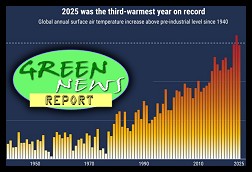 'Green News Report' 1/15/26
'Green News Report' 1/15/26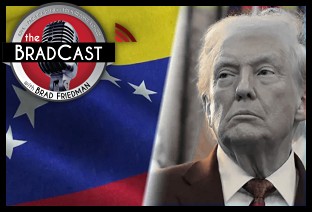 'This Isn't Close to Over': Mad King Trump in Venezuela (and Beyond): 'BradCast' 1/14
'This Isn't Close to Over': Mad King Trump in Venezuela (and Beyond): 'BradCast' 1/14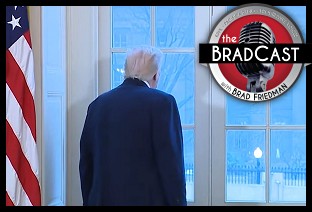 Things Getting Weirder as Trump Keeps Losing: 'BradCast' 1/13/26
Things Getting Weirder as Trump Keeps Losing: 'BradCast' 1/13/26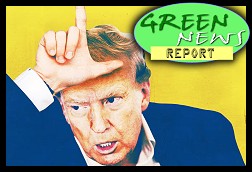 'Green News Report' 1/13/26
'Green News Report' 1/13/26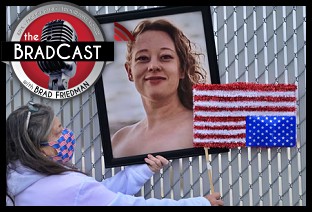 After ICE Murder in MN, Local Cops Disown Fed Policing Practices: 'BradCast' 1/12/26
After ICE Murder in MN, Local Cops Disown Fed Policing Practices: 'BradCast' 1/12/26 Sunday 'Ice Age' Toons
Sunday 'Ice Age' Toons 'Green News Report' 1/8/26
'Green News Report' 1/8/26 Trump to Congress, Climate, U.N., Rule of Law: DROP DEAD - 'BradCast' 1/8/26
Trump to Congress, Climate, U.N., Rule of Law: DROP DEAD - 'BradCast' 1/8/26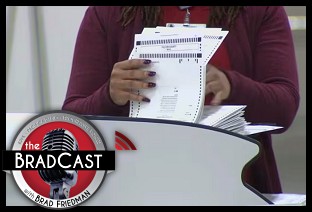 'Nonsense': Trumpers Claim 315k Fraudulent GA Votes in 2020: 'BradCast' 1/7/26
'Nonsense': Trumpers Claim 315k Fraudulent GA Votes in 2020: 'BradCast' 1/7/26 Jack Smith Testimony on Trump J6 Crimes, DOJ Weaponization: 'BradCast' 1/6/26
Jack Smith Testimony on Trump J6 Crimes, DOJ Weaponization: 'BradCast' 1/6/26 Trump War on Venez. is About Ego, Power, 'Alien Enemies Act': 'BradCast' 1/5/26
Trump War on Venez. is About Ego, Power, 'Alien Enemies Act': 'BradCast' 1/5/26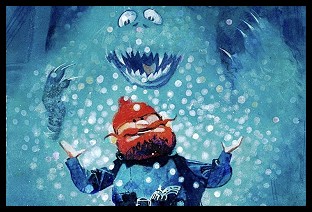 Have a Holly Jolly Somehow
Have a Holly Jolly Somehow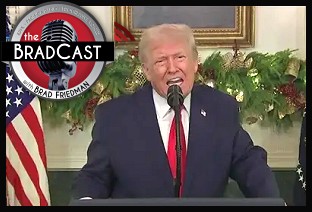 Old Man Shouts at People from WH for 20 Minutes: 'BradCast' 12/18/25
Old Man Shouts at People from WH for 20 Minutes: 'BradCast' 12/18/25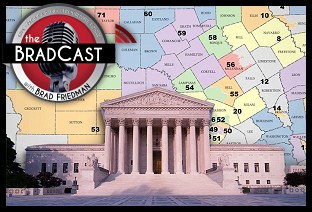 SCOTUS' How-To on Gerrymandering on 'Eve' of Election Year: BradCast' 12/17/25
SCOTUS' How-To on Gerrymandering on 'Eve' of Election Year: BradCast' 12/17/25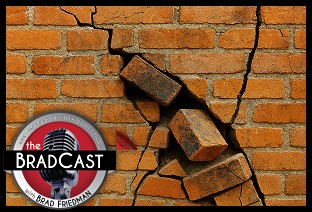 Bricks in the Wall: 'BradCast' 12/16/25
Bricks in the Wall: 'BradCast' 12/16/25
 VA GOP VOTER REG FRAUDSTER OFF HOOK
VA GOP VOTER REG FRAUDSTER OFF HOOK Criminal GOP Voter Registration Fraud Probe Expanding in VA
Criminal GOP Voter Registration Fraud Probe Expanding in VA DOJ PROBE SOUGHT AFTER VA ARREST
DOJ PROBE SOUGHT AFTER VA ARREST Arrest in VA: GOP Voter Reg Scandal Widens
Arrest in VA: GOP Voter Reg Scandal Widens ALL TOGETHER: ROVE, SPROUL, KOCHS, RNC
ALL TOGETHER: ROVE, SPROUL, KOCHS, RNC LATimes: RNC's 'Fired' Sproul Working for Repubs in 'as Many as 30 States'
LATimes: RNC's 'Fired' Sproul Working for Repubs in 'as Many as 30 States' 'Fired' Sproul Group 'Cloned', Still Working for Republicans in At Least 10 States
'Fired' Sproul Group 'Cloned', Still Working for Republicans in At Least 10 States FINALLY: FOX ON GOP REG FRAUD SCANDAL
FINALLY: FOX ON GOP REG FRAUD SCANDAL COLORADO FOLLOWS FLORIDA WITH GOP CRIMINAL INVESTIGATION
COLORADO FOLLOWS FLORIDA WITH GOP CRIMINAL INVESTIGATION CRIMINAL PROBE LAUNCHED INTO GOP VOTER REGISTRATION FRAUD SCANDAL IN FL
CRIMINAL PROBE LAUNCHED INTO GOP VOTER REGISTRATION FRAUD SCANDAL IN FL Brad Breaks PA Photo ID & GOP Registration Fraud Scandal News on Hartmann TV
Brad Breaks PA Photo ID & GOP Registration Fraud Scandal News on Hartmann TV  CAUGHT ON TAPE: COORDINATED NATIONWIDE GOP VOTER REG SCAM
CAUGHT ON TAPE: COORDINATED NATIONWIDE GOP VOTER REG SCAM CRIMINAL ELECTION FRAUD COMPLAINT FILED AGAINST GOP 'FRAUD' FIRM
CRIMINAL ELECTION FRAUD COMPLAINT FILED AGAINST GOP 'FRAUD' FIRM RICK SCOTT GETS ROLLED IN GOP REGISTRATION FRAUD SCANDAL
RICK SCOTT GETS ROLLED IN GOP REGISTRATION FRAUD SCANDAL VIDEO: Brad Breaks GOP Reg Fraud Scandal on Hartmann TV
VIDEO: Brad Breaks GOP Reg Fraud Scandal on Hartmann TV RNC FIRES NATIONAL VOTER REGISTRATION FIRM FOR FRAUD
RNC FIRES NATIONAL VOTER REGISTRATION FIRM FOR FRAUD EXCLUSIVE: Intvw w/ FL Official Who First Discovered GOP Reg Fraud
EXCLUSIVE: Intvw w/ FL Official Who First Discovered GOP Reg Fraud GOP REGISTRATION FRAUD FOUND IN FL
GOP REGISTRATION FRAUD FOUND IN FL

































